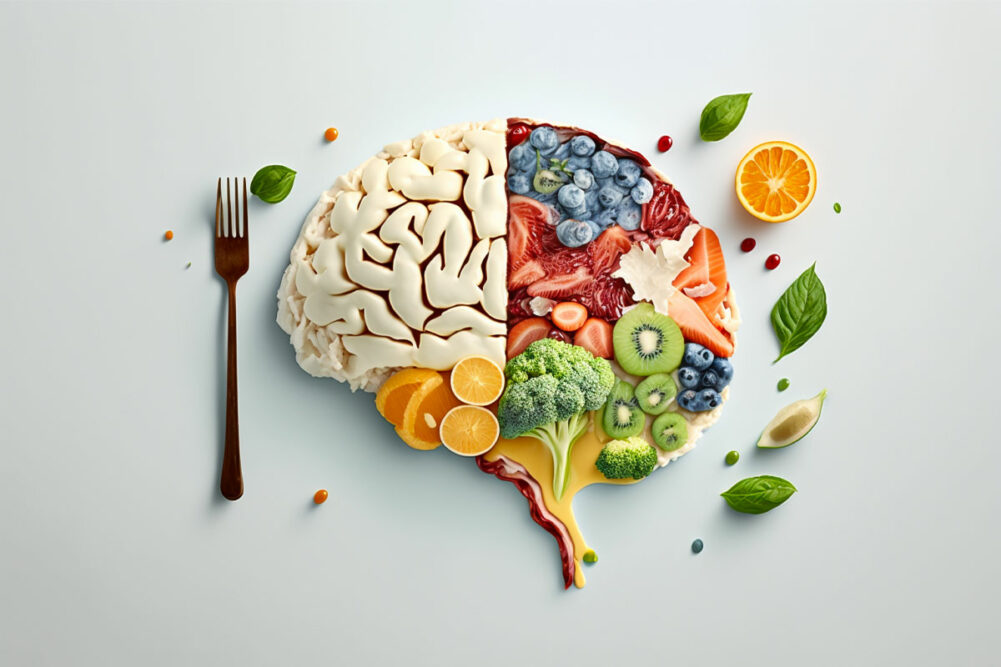The connection between diet and brain function is undeniable. What we eat doesn’t just impact our physical health—it plays a crucial role in our mental clarity, cognitive function, and emotional well-being. Neuroscientists and nutritionists alike have found that the brain requires specific nutrients to function optimally. By making conscious dietary choices, we can enhance memory, focus, and overall mental performance.
The Brain-Nutrition Connection
The brain is an energy-intensive organ, using about 20% of the body’s total energy. To function at its best, it requires a steady supply of essential nutrients. Research in neuroscience has shown that poor diet choices can lead to cognitive decline, brain fog, and mental fatigue, while a nutrient-rich diet can enhance neural function and protect against disorders like depression and Alzheimer’s disease.
Key Nutrients for Mental Clarity
1. Omega-3 Fatty Acids
Found in fatty fish like salmon, walnuts, and flaxseeds, omega-3s are essential for brain health. These healthy fats build cell membranes in the brain and promote communication between neurons, improving memory and focus. Studies show that a diet rich in omega-3s can reduce the risk of cognitive decline and improve mood stability.
2. Antioxidants (Vitamins C and E, Flavonoids, and Polyphenols)
Oxidative stress can damage brain cells and accelerate aging. Antioxidant-rich foods like berries, dark chocolate, green tea, and leafy greens help neutralize harmful free radicals, protecting the brain from inflammation and cognitive decline.
3. B Vitamins (B6, B12, and Folate)
These vitamins are critical for neurotransmitter production, which influences mood and cognitive function. A deficiency in B vitamins, commonly found in whole grains, eggs, and legumes, can lead to brain fog, fatigue, and even depression.
4. Protein and Amino Acids
Amino acids, found in protein-rich foods like lean meats, eggs, beans, and dairy, are the building blocks of neurotransmitters such as dopamine and serotonin. These chemicals regulate mood, motivation, and concentration. A diet lacking in protein can lead to low energy and poor cognitive function.
5. Complex Carbohydrates
The brain relies on glucose for energy, but the source of glucose matters. Whole grains, fruits, and vegetables provide a steady release of energy, preventing mental fatigue and mood swings. In contrast, refined sugars and processed carbs cause energy crashes and impaired concentration.
The Gut-Brain Axis: How Digestion Affects the Mind
Recent research highlights the connection between gut health and brain function. The gut microbiome—trillions of bacteria living in the digestive tract—plays a vital role in mood regulation, immune function, and mental clarity. Fermented foods like yogurt, kimchi, and kefir help maintain a healthy gut microbiome, reducing inflammation and improving neurotransmitter production.
Foods to Avoid for Better Mental Performance
Just as certain foods enhance brain function, others can impair it:
- Processed and fast foods high in trans fats and preservatives contribute to inflammation and sluggish cognition.
- Excessive sugar leads to energy crashes and memory impairment.
- Artificial sweeteners and additives may negatively affect neurotransmitter balance and mood stability.
Conclusion
From neuroscience to nutrition, it’s clear that diet has a profound impact on mental clarity and overall brain health. By incorporating nutrient-rich foods and avoiding harmful processed options, we can optimize cognitive function, maintain emotional balance, and support long-term brain health. Making mindful food choices is one of the most powerful steps toward a sharper, healthier mind.

